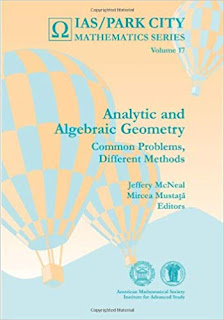viernes, 8 de noviembre de 2019
Home »
» Analytic and Algebraic Geometry: Common Problems, Different Methods
Analytic and Algebraic Geometry: Common Problems, Different Methods
Analytic and algebraic geometers often study the same geometric structures but bring different methods to bear on them. While this dual approach has been spectacularly successful at solving problems, the language differences between algebra and analysis also represent a difficulty for students and researchers in geometry, particularly complex geometry. The PCMI program was designed to partially address this language gulf, by presenting some of the active developments in algebraic and analytic geometry in a form suitable for students on the ""other side"" of the analysis-algebra language divide. One focal point of the summer school was multiplier ideals, a subject of wide current interest in both subjects. The present volume is based on a series of lectures at the PCMI summer school on analytic and algebraic geometry. The series is designed to give a high-level introduction to the advanced techniques behind some recent developments in algebraic and analytic geometry. The lectures contain many illustrative examples, detailed computations, and new perspectives on the topics presented, in order to enhance access of this material to non-specialists. Titles in this series are co-published with the Institute for Advanced Study/Park City Mathematics Institute.|Analytic and algebraic geometers often study the same geometric structures but bring different methods to bear on them. While this dual approach has been spectacularly successful at solving problems, the language differences between algebra and analysis also represent a difficulty for students and researchers in geometry, particularly complex geometry. The PCMI program was designed to partially address this language gulf, by presenting some of the active developments in algebraic and analytic geometry in a form suitable for students on the ""other side"" of the analysis-algebra language divide. One focal point of the summer school was multiplier ideals, a subject of wide current interest in both subjects. The present volume is based on a series of lectures at the PCMI summer school on analytic and algebraic geometry. The series is designed to give a high-level introduction to the advanced techniques behind some recent developments in algebraic and analytic geometry. The lectures contain many illustrative examples, detailed computations, and new perspectives on the topics presented, in order to enhance access of this material to non-specialists. Titles in this series are co-published with the Institute for Advanced Study/Park City Mathematics Institute.











0 comentarios:
Publicar un comentario